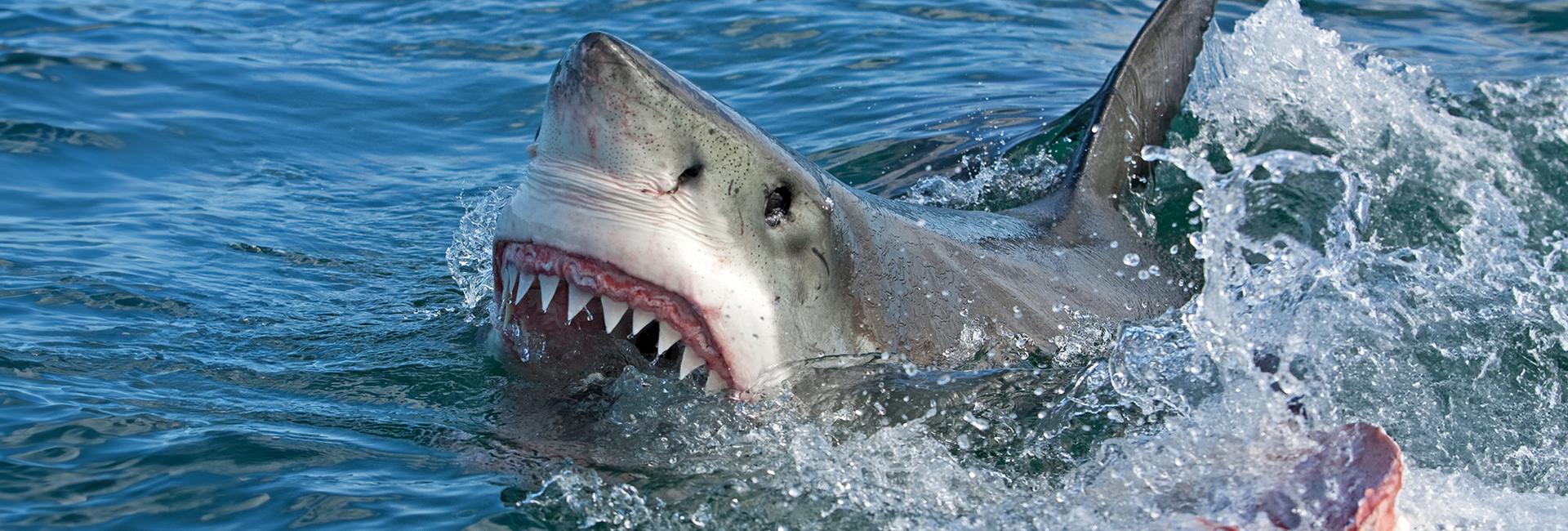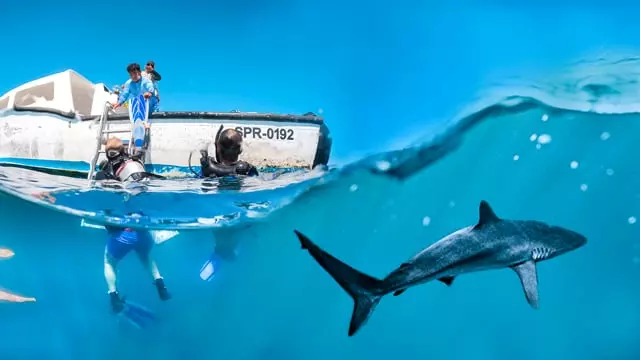
Sharks
Volunteer With Sharks
Sharks, the enigmatic guardians of the ocean, have patrolled the seas for millions of years, their presence essential to the delicate balance of marine ecosystems. Yet, over the years, hundreds of shark species have experienced a sharp fall in populations due to overfishing, bycatch, pollution, and the devastating shark fin trade. Sadly, the villainization of sharks due to the 'Jaws Effect' and other media depictions have made it incredibly difficult to inspire the public's compassion and rally support for crucial shark conservation efforts.
Fewer than 10 people are killed by sharks each year, while humans kill up to 100 million sharks annually - it seems that sharks, not us, have far more to fear. Volunteer with sharks to help rewrite the narrative and challenge harmful misconceptions leading to the species' decline. From cage diving with great whites in South Africa, monitoring whale sharks along Mafia Island, or hammerhead shark tagging in Mozambique, as a shark conservation volunteer, you'll have the chance to dive deeper into their world and make a difference from the top of the food chain down.

Projects Do More
14 - 84 Nights from $1,344.00
Cage dive for conservation in Gansbaai! Experience the thrill of shark cage diving in South Africa on The Great Shark Project, while helping protect these misunderstood predators through hands-on marine conservation.
View project14 - 84 Nights from $2,019.00
Dive unexplored reefs and partake in marine conservation projects amongst the islands of the beautiful Raja Ampat archipelago.
View project6 - 55 Nights from $939.00
Dive into the incredible waters of the Perhentian Islands and aid marine conservation by volunteering in Malaysia!
View project13 - 83 Nights from $1,344.00
Join this unique whale shark internship project on the stunning Mafia Island in Tanzania.
View project13 - 83 Nights from $2,564.00
Work towards integral marine conservation in one of the most marine-rich locations on Earth.
View project4 - 53 Nights from $1,074.00
Dive in paradise, help preserve the Belize Barrier Reef, and enjoy private island life!
View projectOn the Blog
Shark Information
Sharks At A Glance
Endangered Status
Dependent on Species
Number remaining in the wild
Dependent on Species
Endemic Region
Oceans Worldwide
There are over 500 species of sharks, and many are endangered due to a variety of factors, including overfishing, habitat degradation, and the demand for shark fins (primarily used in shark fin soup). According to the International Union for Conservation of Nature (IUCN), around one-third of all shark species are threatened with extinction. Some of the most endangered species include:
- Great Hammerhead Sharks - Critically Endangered
- Scalloped Hammerhead Sharks - Critically Endangered
- Whale Sharks - Endangered
- Oceanic Whitetip Sharks - Critically Endangered
- Angel Sharks - Critically Endangered
While other more well-known sharks are classed as 'Vulnerable' on the IUCN Red List, including great white, bull and blacktip sharks, their population trends are still decreasing. By joining a shark volunteer program, you could aid vital research that prevents these and similar species from reclassification from 'Vulnerable' to 'Endangered'.
Sharks face several significant threats, primarily due to human activity. These threats include:
- Overfishing and Wildlife Trade: Sharks are often targeted for their fins, meat, oil, and cartilage. Shark finning, where fins are removed and the rest of the shark is discarded, is a particularly destructive practice that contributes to population decline. Many shark species reproduce slowly, making it hard to recover from overfishing.
- Bycatch: Sharks are frequently caught unintentionally in fishing gear meant for other species, such as tuna or swordfish. This accidental capture, known as bycatch, can be fatal for sharks, as they often get entangled in nets or hooked on longlines.
- Habitat destruction: Coastal development, pollution, and climate change can destroy or degrade the marine ecosystems that sharks rely on, including coral reefs and mangroves. Destruction of these habitats can reduce available food sources and breeding grounds.
- Pollution: Marine pollution, especially plastic waste, can be harmful to sharks. Plastics can cause injury if ingested, and toxic chemicals from pollutants can accumulate in their bodies over time, affecting their health and reproduction.
- Climate change: Warming oceans affect shark habitats and migration patterns. Additionally, ocean acidification can impact prey availability and the health of ecosystems like coral reefs, which some shark species rely on.
- Shark tourism: In some areas, unregulated shark tourism can cause stress and behavioural changes in shark populations. While ecotourism can have positive effects when managed well, poorly regulated interactions can disturb sharks' natural behaviour. It is important to choose ethical projects when looking to volunteer with sharks.
Shark conservation aims to protect declining shark populations through regulating overfishing, banning harmful practices such as shark finning, and safeguarding their habitats. Sharks play a crucial role in marine ecosystems by maintaining the balance of species. Conservation initiatives focus on raising public awareness, conducting research, and promoting sustainable fishing laws. To get involved, individuals can support organisations dedicated to shark conservation by donating or raising awareness of their work, avoiding personal consumption of shark products, participating in beach cleanups, or advocating for stricter regulations by signing petitions and supporting policy changes that protect sharks and their habitats.
By joining a shark conservation volunteer project, you can help make a difference by monitoring shark populations, collecting data, compiling ID kits, shark tagging, and educating local schools and communities on the importance and misconceptions of sharks. Alongside direct shark conservation efforts, volunteers help with wider marine conservation, from assisting with monitoring other species to setting up and maintaining coral nurseries.










